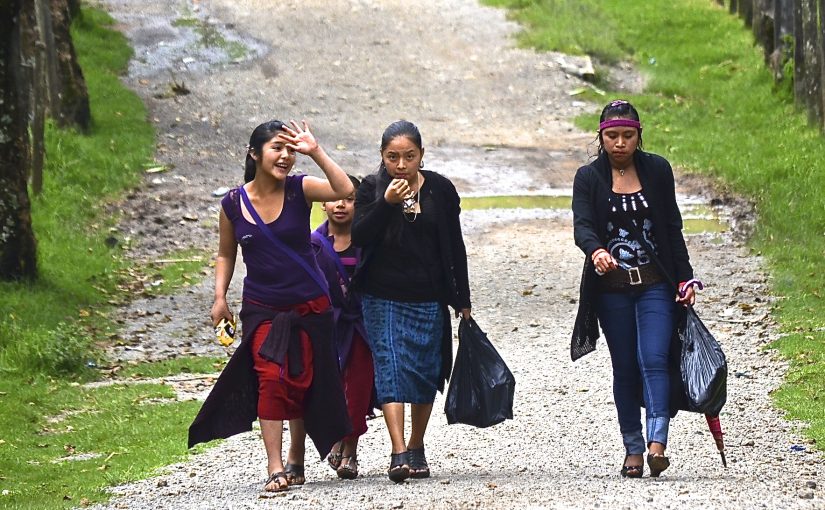In this lesson you will various words used to ask questions. These words are known as interrogative pronouns and are similar to the wh- question words in English (what, when, which, whom, how). Unlike English, K’iche’ does not need an auxiliary verb “do” to form wh- questions.
In this lesson, we are reminded not to try to make one-to-one correspondences between K’iche’ phrases and their corresponding English translations. Some of the phrases below are idiomatic constructions that have developed over time and have nuanced meanings and uses.
Al To’n: Alo
A Lu’: Alo, saqirik al To’n. La k’o ri a Si’s?
Al To’n: Maj, maj le a Si’s.
A Lu’: Jawi le xb’e wi?
Al To’n: Pa tijob’al xb’e wi.
A Lu’: E k’u ri a tat, ri a nan. La e k’olik?
Al To’n: E maj, ri a’re’ pa tyox xeb’e wi.
A Lu’: Jachin k’u k’o kan pa le iwo’ch?
Al To’n: Xaq xew in cherma pa jub’eq’ kimb’e pa le tinamit.
A Lu’: Aaaa Je chuq in kimb’e pa le tinamit pa jub’eq’. La kawaj junam kojb’ek?
Al To’n: Utz la’ junam kojb’ek we maj kub’an chawe keb’e le e wachi’il quk’.
A Lu’: Maj kub’ano. Utz la’, al To’n, kimb’e iwuk’!
Al To’n: Utz la’ a Lu’! Kaqariq qib’ pa jub’eq’ pa le wo’ch, chi’ nab’e kepe wi le e wachi’il.
A Lu’: Ja’e al To’n, kaqil qib’ pa jub’eq’! Jeb’a’.
Al To’n: Jeb’a.
Al To’n: Hello.
A Lu’: Hello, good morning Antonia. Is Francisco home?
Al To’n: No, Francisco isn’t (here).
A Lu’: Where did he go?
Al To’n: He went to school.
A Lu’: And your parents, are they home?
Al To’n: They aren’t. They went to church.
A Lu’: Who is at your (you all) house, then?
Al To’n: Just me, but I am going to town in a bit.
A Lu’: Aaaa I am also going to town in a bit. Do you want to go together?
Al To’n: Ok, we’ll go together if you don’t mind that my friends come with us.
A Lu’: No problem. Good, I will go with you (all).
Al To’n: Ok, we’ll meet at my house in a bit. My friend are coming here first.
A Lu’: Ok, Antonia. See you soon. Goodbye!
Al To’n: Goodbye!
Questions in K’iche’
| Jachin? | Who…? |
| -Jachin ruk’ katb’e wi? -Ruk’ le al Talin. |
Who are you going with? With Catalina. |
| Jachin che? | To whom? |
| -Jachin che kinya wi le wuj? -Che le tijoxel. |
-Who do I give the book to? -To the student. |
| Jas? | What? |
| -Jas ub’i’ le atinamit? -Nawalja’ le ub’i’. |
-What’s the name of your town? -Nahualá (is the name). |
| Jas uwach? | What kind/type? |
| -Jas uwach le rikil kakitij le a’j Nawalja’? –Kakitij le kinaq’, le ichaj, le uwa’l ik ruk’ lej. |
-What kind of dishes do the people of Nahualá eat? -They eat beans, herbs, and soup with tortillas. |
| Jas ub’anom? | How is someone/it doing? |
| –Jas ub’anom le nuch’utitat’? –Utz ub’anom. |
-How is my uncle doing? -He is doing well. |
| Jas ub’antajik? | What is it like? |
| -Jas ub’antajik le tinamit Nawalja’? –Sib’alaj je’l. |
-What is the town Nahualá like? -Very pretty. |
| Jas ub’anik? | What is it made of?/What is it like? |
| – Jas ub’anik le kami’x? -Kaq le upam, k’o uta’k, q’otal le uwi’ uq’ab’. |
-What’s the shirt like? -It has a red background, a collar, and embroidered sleeves. |
| Jachike? | Which one? What (when picking from among many?) |
| -Jachike ik’ le unimaq’ij le tinamit Nawalja’? –Pa le ik’ noviembre. |
-Which month is Nahualá’s (patron saint) feast? -In November. |
| Jas che? | Why? |
| –Jas che xechaqij le ab’ix? -Rumal maj le jab’. |
-Why did the cornfields dry out? -Because there is no rain. |
| Jas chemna kixpe chwe’q? (the following verb is not negated) | Why will y’all not come tomorrow? |
| Jawi? (+wi) | Where? |
| – Jawi xatwa’ wi? -Pa le wo’qb’al. |
-Where did you eat? -At the restaurant/dinner. |
| –Jawi at k’o wi? | -Where are you? |
| Jampa? | When? |
| -Jampa kojb’e pa le tyox? -Pa doming. |
-When are we going to church? -On Sunday. |
| Janipa | How much? |
| –Janipa rajil jun su’t pa Nawaja’? –O’k’al q’uq’. |
-How much is a (traditional) handkerchief in Nahualá? -One hundred quetzales. |
| E janipa? | How many? (talking about animate entities) |
| –E janipa le awalk’wal e k’olik? -E k’o oxib’ le walk’wal: e keb’ alabom, jun ali. |
-How many children do you have? -I have three children: two boys and one girl. |
Translate the following phrases into K’ich’e’:
- Who went to the library yesterday?
- What did you (formal) say?
- What is your town like?
- What did you not understand?
- What do you think?
- Where is the cat?
- Where did she go?
- How many children do you have?
- How much is this?
Answers
- Jachin xb’e pa le k’olb’al wuj iwir?
- Jas xb’ij la?
- Jas ub’anik le atinamit?
- Jachike le na xak’oxomaj taj?
- Jas kachomaj?
- Jawi k’o wi le me’s?
- Jawi xb’e wi?
- E janipa le a’walk’wal e k’olik? O E janipa le a’wal e k’olik?
- Janipa rajil wa’?

